Resources
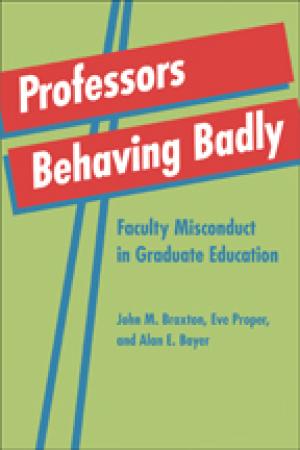
• A faculty member publishes an article without offering coauthorship to a graduate assistant who has made a substantial conceptual or methodological contribution to the article. • A professor does not permit graduate students to express viewpoints different from her own. • A graduate student close to finishing his dissertation cannot reach his traveling advisor, a circumstance that jeopardizes his degree. This book discusses these and other examples of faculty misconduct—and how to avoid them. Using data collected through faculty surveys, the authors describe behaviors associated with graduate teaching which are considered inappropriate and in violation of good teaching practices. They derive a normative structure that consists of five inviolable and eight admonitory proscriptive criteria to help graduate faculty make informed and acceptable professional choices. The authors discuss the various ways in which faculty members acquire the norms of teaching and mentoring, including the graduate school socialization process, role models, disciplinary codes of ethics, and scholarship about the professoriate and professional performance. Analyzing the rich data gleaned from the faculty surveys, they track how these norms are understood and interpreted across academic disciplines and are influenced by such factors as gender, citizenship, age, academic rank, tenure, research activity, and administrative experience. (From the Publisher)
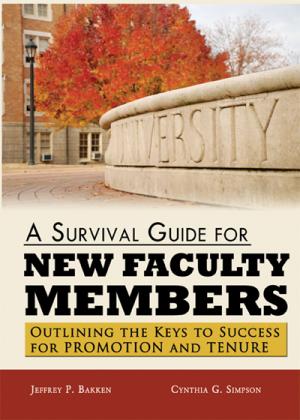
The Survival Guide for New Faculty Members: Outlining the Keys to Success for Promotion and Tenure provides new faculty members with practical, down-to-earth wisdom and suggestions for successfully working through to tenure and promotion. The authors—both successful and experienced administrators and experts in higher education—have provided an extremely well-organized and useful guide for new faculty members. It focuses on all aspects of becoming a new faculty member including the various expectations in completing a successful journey toward promotion and tenure. The book underscores the importance of recognizing the three facets of faculty life of teaching, research, and service. This volume clearly sets out, compares, and separates those three components with clarity and provides very useful advice for putting the three together. Taken together with the chapters on “Documenting Your Progress” and “Promotion and Tenure,” new faculty are provided with a solid, practical introduction to building a foundation for success in higher education. Feedback and tips are also provided within each chapter. It is written in a style that readers will be able to easily comprehend and understand and is supported with many examples. In addition, the information can be easily applied to new faculty at various types of institutions of higher education. (From the Publisher)
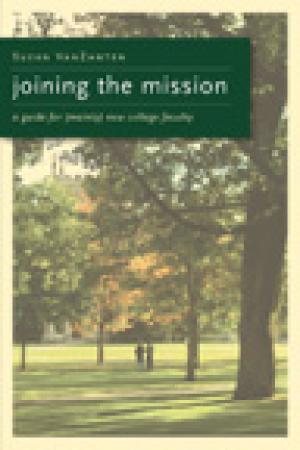
Joining the Mission is a helpful guide for new (and experienced) faculty at religious colleges and universities. Susan VanZanten here provides an orientation to the world of Christian higher education and an introduction to the academic profession of teaching, scholarship, and service, with a special emphasis on opportunities and challenges common to “mission-driven” institutions. From designing a syllabus to dealing with problem students, from working with committees to achieving a balanced life, VanZanten's guidebook will help faculty across the disciplines — Art to Zoology and every subject between — understand better what it means to pursue faithfully a vocation as professor. (From the Publisher)
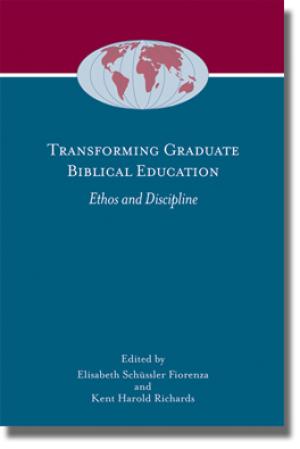
This unique collection of essays, originating in seminars held at SBL’s Annual and International Meetings, explores the current ethos and discipline of graduate biblical education from different social locations and academic contexts. It includes international voices of well-established scholars who have urged change for some time alongside younger scholars with new perspectives. The individual contributions emerge from a variegated set of experiences in graduate biblical studies and a critical analysis of those experiences. The volume is divided into four areas of investigation. The first section discusses the ethos of biblical studies and social location, and the second explores different cultural-national formations of the discipline. The third section considers the experiences and visions of graduate biblical studies, while the last section explores how to transform the discipline. All the contributions offer ways to transform graduate biblical education so that it becomes a socializing power that, in turn, can transform the present academic ethos of biblical studies. (From the Publisher)

Sitting down with a young and brilliant mathematician, I asked what he thought were his biggest problems in working toward tenure. Instead of describing difficulties with his equations or his software programs, he lamented that (a) his graduate assistant wasn’t completing his tasks on time, (b) his department chair didn’t seem to care if junior faculty obtained grants, and (c) a senior professor kept glaring at him in faculty meetings. He knew he could handle the intellectual side of being an academic—but what about the people side? ‘Why didn’t they offer Promotion and Tenure Confidential provides that course in an astute and practical book, which shows that P&T is not just about research, teaching, and service but also about human relations and political good sense. Drawing on research and extensive interviews with junior and senior faculty across many institutions, David D. Perlmutter provides clear-sighted guidance on planning and managing an academic career, from graduate school to tenure and beyond. Topics include: Making the transformation from student and protégé to teacher and mentor. Seeking out and holding onto lifelong allies. How to manage your online reputation and avoid “death by Google”. What to say and what not to say to deans and department chairs. How meeting deadlines wins points with everyone in your life. How, when, and to whom to say “no”. When and how to look for a new job when you have a job. How (and whom) to ask for letters of recommendation. What to do if you know you’re not going to get tenure. (From the Publisher)
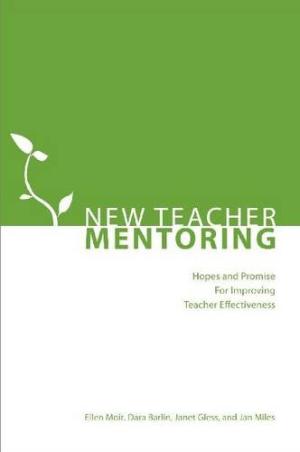
This book is written for K-12 educational contexts, but many of its ideas and analyses can be applied to higher education contexts.

From the Publisher Written for anyone who works with graduate students to support their teaching efforts in American research universities, this book draws on the extensive experience of professional educators who represent a variety of programs throughout the United States. They understand the common constraints of many TA development classes, workshops, and programs, as well as the need for motivating and sophisticated techniques that are, at the same time, practical and focused. Their contributions to this book have proven to be effective in developing the sophisticated communication skills required by TAs across the disciplines.

This groundbreaking book explores the current state of doctoral education in the United States and offers a plan for increasing the effectiveness of doctoral education. Programs must grapple with questions of purpose. The authors examine practices and elements of doctoral programs and show how they can be made more powerful by relying on principles of progressive development, integration, and collaboration. They challenge the traditional apprenticeship model and offer an alternative in which students learn while apprenticing with several faculty members. The authors persuasively argue that creating intellectual community is essential for high-quality graduate education in every department. Knowledge-centered, multigenerational communities foster the development of new ideas and encourage intellectual risk taking. (From the Publisher)
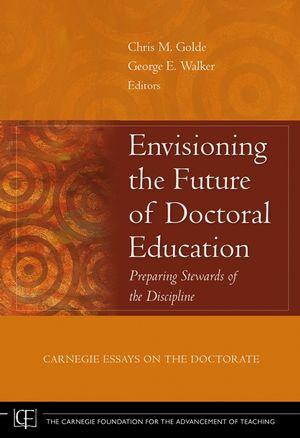
The development of students as “stewards of the discipline” should be the purpose of doctoral education. A steward is a scholar in the fullest sense of the term—someone who can imaginatively generate new knowledge, critically conserve valuable and useful ideas, and responsibly transform those understandings through writing, teaching, and application. Stewardship also has an ethical and moral dimension; it is a role that transcends a collection of accomplishments and skills. A steward is someone to whom the vigor, quality, and integrity of the field can be entrusted. The most important period of a steward’s formation occurs during formal doctoral education. Envisioning the Future of Doctoral Education is a collection of essays commissioned for the Carnegie Initiative on the Doctorate. The question posed to the essayists in this volume was, “If you could start de novo, what would be the best way to structure doctoral education in your field to prepare stewards of the discipline?” The authors of the essays are respected thinkers, researchers, and scholars who are experienced with and thoughtful about doctoral education. (From the Publisher)